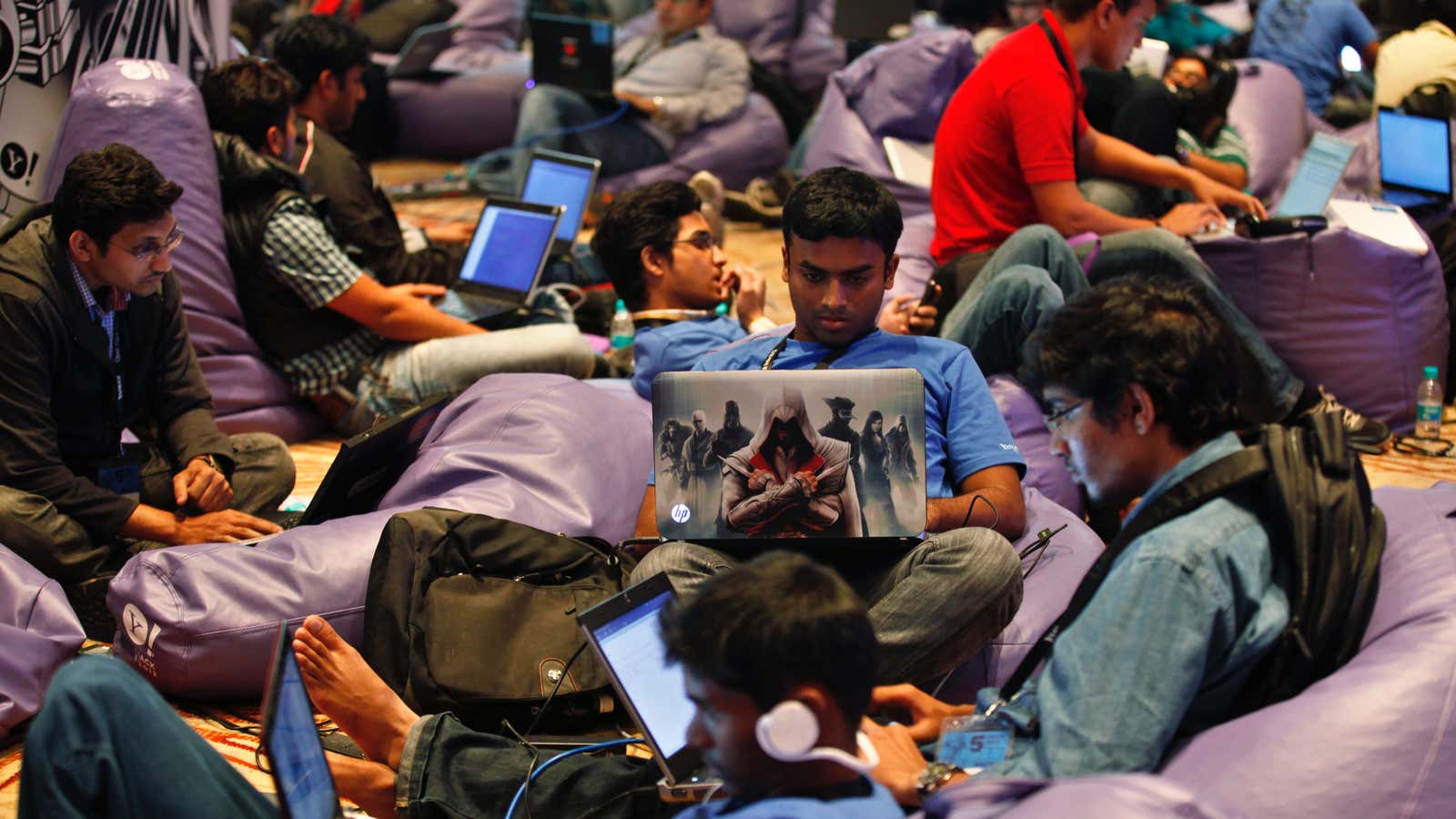The sky-high salaries at Indian startups have come under the lens ever since the sector began unraveling over the past year or so. However, investors and entrepreneurs insist that such large payouts may have their advantage and, in some cases, may even be necessary.
While India is still a hotbed of startup activity, the blitzkrieg phase may well be over. Companies like Flipkart and Snapdeal have come under fire for pampering employees even as they bled and their valuations eroded. Three years ago, over four-fifths of Indian startups were paying junior employees Rs5.5 lakh ($8,418) per annum, far more than the market median. Even IT industry bigwigs Infosys, Tata Consultancy Services, and Wipro paid close to Rs3 lakhs ($4,581) to new hires in this time.
Nevertheless, such payouts weren’t unreasonable, say some observers.
Since nascent firms can’t guarantee job security, big-ticket salary packages must be offered to risk-takers. Secondly, talent is scarce in India. When competing with traditional businesses, especially India’s $160-billion IT industry, as well as Silicon Valley, only higher salaries could ensure supply of the right kind of recruits.
“The primary way employees should be convinced to take a risk with early stage companies is via substantial equity,” says Arpan Shah, a Stanford graduate and an advisor to venture capital firms in India and the Czech Republic.
As the company starts to grow, employees would want proportional stakes in that success, too. Long-term financial incentives like employee stock options can also help lure people in the initial years. For instance, a peon at mobile wallet startup Citrus Pay, whose annual salary was Rs8,000 ($120), earned Rs50 lakh ($75,000) from his stock options after Netherlands-based PayU acquired Citrus Pay for $130 million.
However, the other issue is, how many talented risk-takers are there to choose from?
Talent drought
The paucity of talent in India can be traced back to institutional flaws in education and dismal funding of university research by the government. Only 2% of India’s workforce is considered skilled. Barring names like the elite Indian Institutes of Management (IIMs) or Indian Institutes of Technology, most of India’s 5,500 B-schools and engineering colleges produce “un-employable” graduates.
This creates an acute crunch and, in turn, fuels higher salaries.
So, when startups “find people that have the required mindset and competence to build high quality products, they end up competing aggressively among each other,” Sandeep Murthy, co-founder and partner at Mumbai-based Lightbox VC, told Quartz. After all, startups expected the market to balloon and their companies to grow, driving up their demand for engineers and techies. But what if they don’t, and instead head for a collapse?
“When the company winds down operations, or the employee is relieved from duties, he or she will continue to believe that they deserve ‘X-plus’ salaries,” Ajay Ramasubramaniam, director at Zone Startups India, a startup accelerator, told Quartz. “This can lead to talent drain in more than one ways,” he said.
All the more so when the talent is also experienced, which itself comes at a premium under such circumstances.
Consider this: Homegrown companies like Ola, Flipkart, and Snapdeal, have often tasted success by aping foreign companies—and now competitors—such as Uber and Amazon. The dearth of original ideas led to many founders looking to hire from the world’s biggest innovation hub. ”Carrots were dangled for the ones that had seen this scale outside of India,” Murthy said. Some also saw the Valley hires as a step towards setting up shop in the west.
Such talent didn’t come cheap. Indian firms showered the Valley veterans with tens of millions of rupees as compensation for their loss in terms of greenbacks. The likes of ex-Googlers Peeyush Ranjan and Punit Soni and Facebook’s Namita Gupta are examples. When things changed for the worse, the startups couldn’t hold on to the big names.
“Unfortunately, like many things in India, market scale is arriving on ‘Indian Standard Time’ and so the salaries seem prematurely high for the relative scale,” said Murthy, referring to the sector’s recent underwhelming performance. Indian startups have suffered funding crunches, saturated markets, and poor innovation; companies that were once hiring powerhouses are now laying off in hoards.
